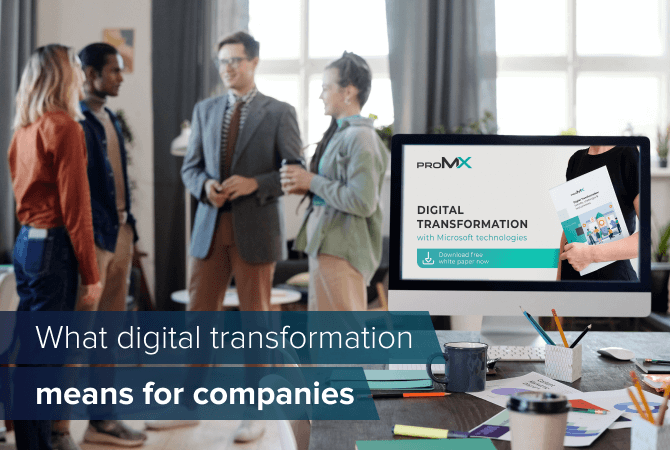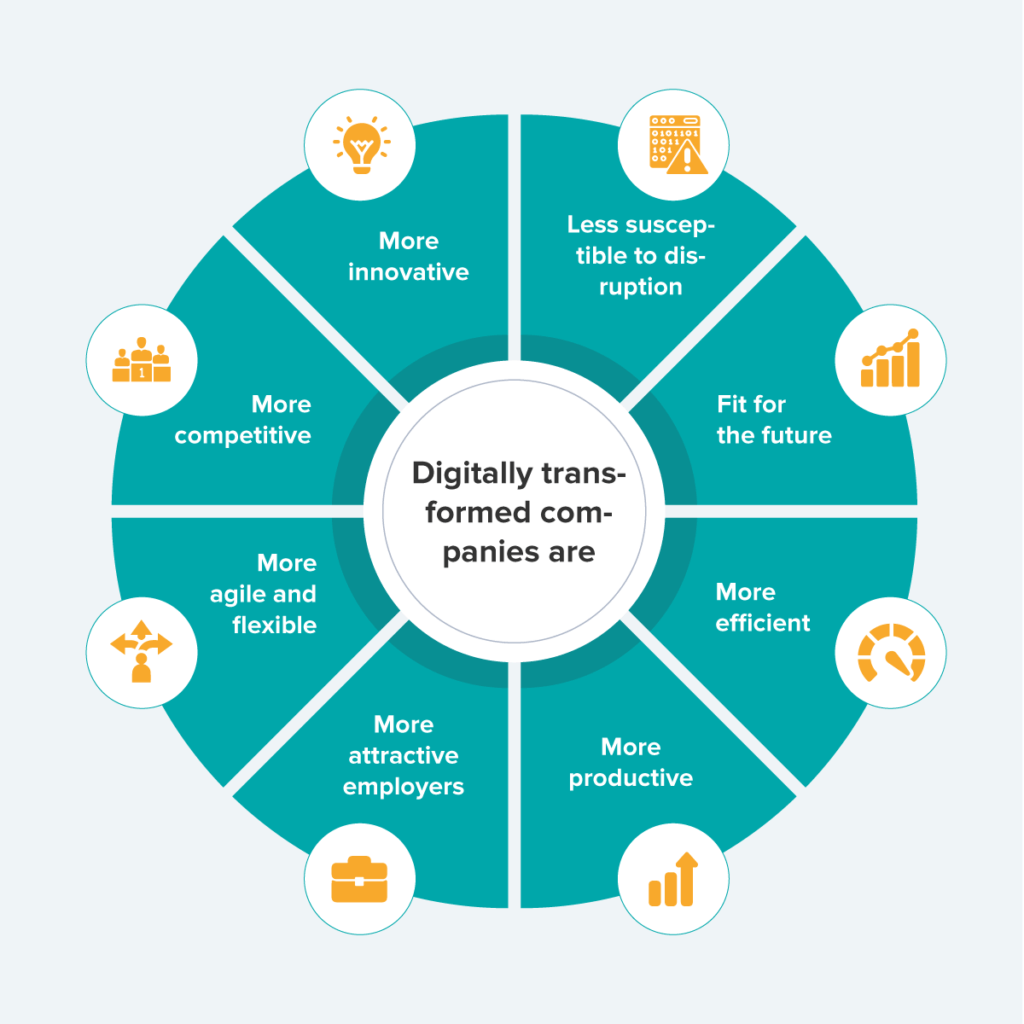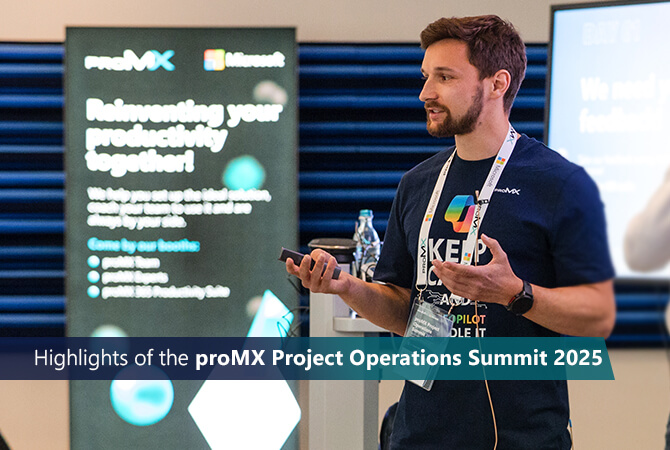
What digital transformation means for companies
Content
The way we shop, watch movies and TV series or make appointments as well as the way we work – they are all examples of digitalization. Collaboration tools and video calls have become part of our daily routine, new digital business models are being developed and companies are discovering digital transformation technologies such as artificial intelligence, IoT or data analysis tools.
In short: Digitalization is here to stay. The digitalization boost the economy is currently experiencing will outlast the COVID-19 pandemic, a vast majority is planning to continue the digitalization projects in their company.
With digitalization comes digital transformation, and digital transformation means change and new opportunities for companies.
Why is digital transformation important? Well, with digitalization comes digital transformation, and digital transformation means change and new opportunities for companies. Introducing new digital technologies breaks down traditional work structures and forces organizations to rethink. The impact of change on the company culture is huge. That is what makes digital transformation a complex process.
What is digital transformation?
Digital transformation means making digital technology part of an organization’s processes and strategies. This fundamentally changes how it operates (more efficiency) and delivers value to its customers (better customer experience), as well as its own employees and other stakeholders.
Tools for digital transformation include:
- Cloud computing
- Big data analytics
- Artificial Intelligence (AI)
- Internet of Things (IoT)
- Blockchain
- Automation
Digital transformation projects typically involves organizational changes, too, for example:
- Process transformation: automation of manual or repetitive tasks; analyzing and streamlining processes to reduce bottlenecks; ensuring a seamless flow of data and information across the organization
- Product and service transformation: turning products or services into digital offerings; utilizing data analytics and customer insights for personalization; innovating and iterating on products and services to keep up with changing customers needs and stay ahead of competitors
- Growth opportunity: reaching new markets and customer segments; new revenue streams by exploring and capitalizing on new business models enabled by digital technology
- Cultural transformation: fostering a culture of innovation, collaboration, and agility with the help of change management; providing training to equip employees with digital skills
- Customer experience: delivering a seamless and consistent experience across multiple channels (website, mobile app, social media); personalized interactions, recommendations, and offers; gathering and acting upon customer feedback to drive continuous improvement in products, services, and experiences
Digitalization and digitization vs. digital transformation: What’s the difference?
“Digitization,” “digitalization” and “digital transformation” are terms that are often used synonymously, whether it’s because it is shorter or perhaps because some don’t know better. Just in case you are among the latter:
Digitalization and digitization
Digitalization describes the implementation of new technologies and their integration into existing business processes. Digitization means turning your paperwork into, well, digital paperwork, for example the files at a law firm.
Digital transformation
Digital transformation is the reaction to change brought about by digitalization. Intelligent technologies optimize processes company-wide, improve the value chain and break down old structures.
Digital transformation benefits

Bonus: Measuring sustainable actions
Microsoft wants to become CO2 negative by 2030. VAUDE uses sustainable materials to produce sports wear and counts on fair work conditions. More and more companies set sustainability goals for acting more responsibly towards people, animals and our planet.
Intelligent technologies let them document, analyze and evaluate processes all around the world. That means: With modern business applications, companies can optimize the sustainability of supply chains (for example the gathering of resources or sending out wares) and thus act more sustainably.
The most important technologies for digital transformation
We now know: Digitization ≠ digitalization ≠ digital transformation. Still, though: both, digitization and digitalization, are an integral part of digital transformation and deeply rooted in the implementation of modern technologies:
Intelligent business apps
Intelligent, productive and, most importantly, custom business apps are crucial for powering digital transformation. With a cloud-based ERP, you can unite, manage and analyze core processes in a single system.
Data analysis tools
A company that doesn’t generate data doesn’t exist, because data is much too valuable. However, it needs to be converted into reports that are easy to read and understand if you want to make decisions and react based on insights. Intelligent tools for data analysis help.
Cloud computing
Companies need to be able to manage and store their increase in data. For that, you need storage and processing power. The cloud supports you with both.
The role of AI in digital transformation
Especially recently, with the prominence of technologies such as Chat GPT or Microsoft’s Copilot, Artificial Intelligence (AI) has become a part of many products and services. It has been an integral part of digital transformation before that, too, playing a significant role by enabling organizations to leverage data, automate processes, enhance decision making, and innovate across various aspects of their operations.
Artificial Intelligence can help you with:
- Data analysis and insights
- Automation and optimization (machine learning, robotic process automation)
- Personalization and customer experience
- Predictive maintenance
- Innovating products and services
How digital transformation impacts different industries
Manufacturing
Digital transformation changes sales, project management, and work on the factory floor with the help of smart manufacturing (IoT sensors, connected devices, and predictive maintenance), an optimized supply chain (improved visibility, transparency, and collaboration), Industry 4.0 technologies (automation, robotics, 3D printing, and artificial intelligence).
Energy
From generation and distribution to consumption and management: the energy sector, too, benefits from digital transformation.
NGOs
When it comes to managing members and supporters or donations, NGOs can become more efficient, transparent and accountable by utilizing digital transformation technologies.
Collaboration in digital teams
Teams become more decentralized with digital transformation. They are spread across different places all over the world and work from home, at the office or while out and about. This changes the way we welcome new colleagues to the company and integrate them as well as collaboration and team spirit in our every-day routine.
It is only normal and human that some employees will need more support than others, especially since working from home and mobile work became a very quick and sudden reality.
In the context of digital transformation, the following concepts and tools play a significant role:
Change management
If digital transformation is accompanied by change management, fears can be resolved, and acceptance of newly introduced technologies and work structures increased. Remember to stick to as little “top-down” as necessary and as much “bottom-up” as possible, meaning: Make sure upper management contributes as many ideas and suggestions as all other employees.
Collaboration tools
Tools for digital collaboration such as Microsoft Teams, Slack or the video-conference tool Zoom have become essential in more and more companies. They make collaboration more efficient and organized, enable working together in documents at the same time, grant centralized access to information and make them more transparent – and much more.
3 steps to develop a digital transformation strategy
Step 1: Digitalize processes
The digitization and digitalization of business processes contributes to the success of digital transformation. Paper documents need to be converted into digital data, and processes need to be optimized. Depending on the company and industry, this could for example mean creating an IoT network for machines.
Step 2: Implement technologies
The mere implementation of new technologies is not enough. Employees of a company need to develop an understanding of the goals behind artificial intelligence and other, how to use these technologies most efficiently and how they can integrate them into their daily work routine. Organize workshops to teach and train them.
Step 3: Manage change
Whether you’re a manager, a specialist or a regular employee – we all have been working with some processes for years or even decades. Suddenly, however, we are asked to rethink? Changes like these can be a cause of anxiety and resistance. If you’re part of the digital transformation of a company, these are cultural challenges you’ll encounter and need to manage as well as be able to communicate the benefits of change.
Managers and specialists in particular need to support digital transformation – and visit leadership and empathy workshops if necessary.
Sooner or later all companies will be affected by digital transformation, whether they’re a small or medium-sized business, or an enterprise. Let’s transform your business together and talk about your project – contact us!













